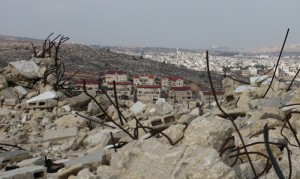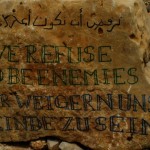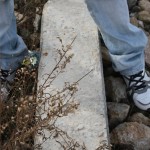
Today I took a walk through a friend’s village near Bethlehem. The sky was blue and spotted with clouds. It was chilly but the sun peaked through with surprising radiance.
First, he (let’s call him Ahmed) showed me a 4×4 inch cement track that follows one entire length of the village, coming within yards of the school. This tiny bit of cement will, maybe within the year, become part of The Wall built by Israel in this case to separate their settlement from the Palestinian village nearby.
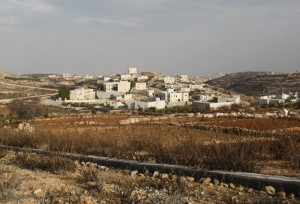
We walked up a dirt road to two demolished houses, the foundation of one home holding the remains of its former walls. The army demolished the houses, saying they posed a security threat. One family lived in a tent for a few months before building a new house.
Standing on top of the rubble, I saw the huge Israeli settlement homes looming above on the highest, closest hill. The houses looked huge and stable, capped with the ubiquitous red roof, a characteristic of Israeli settlement buildings.
We retraced our steps and walked the other way towards the paved settler-road to take pictures of the village from above.
The entire time we walked, the cement track followed us. Ahmed stood with each foot on either side of it, “One day, my left foot won’t be allowed in this spot,†he said.
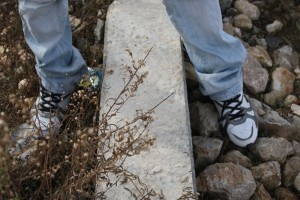
He hesitated for just a second before we had walked up this hill. He wasn’t supposed to walk on it. He said, “If soldiers come, they all know me by name. We will just run to the Palestinian side.â€
Once we reached the top of the hill, Ahmed pointed to three Israeli security cameras. All were pointed at us.
Each time I hear a story like Ahmed’s: homes demolished, livelihood wrecked, school children at risk, land taken, I consider my own family.
If it were my mother’s home being demolished or my brother being harassed daily by soldiers younger than him who haphazardly tote machine guns at their side, I’m not sure how I would react.
Would I try to defend them with violence?
Would I become depressed and feel hopeless?
Would I write about my situation, try to tell the world my story?
I don’t know what I would do, and I believe no one should have to answer this question. But I do know hundreds of Palestinians who have to respond to this question daily.
To read how “Ahmed†and his village have responded, click here.
